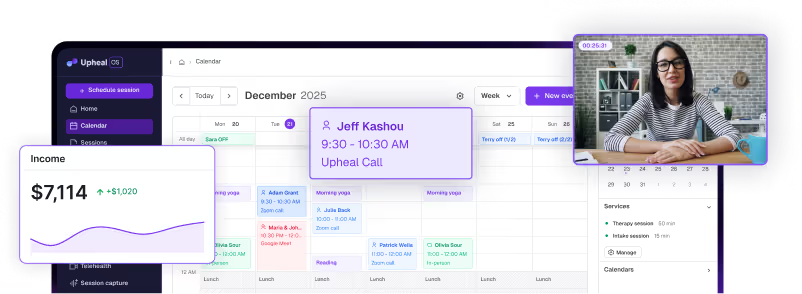SEO basics for private practices: How to get found on Google

Search engine optimization, or SEO, is the process of helping your website rank on Google and other search engines (they exist!). The better you rank, the more likely potential clients are to find your website and reach out about your services.
Think of it this way: If your website is your digital office, SEO is the map helping people find it.
Figuring out SEO can feel like trying to learn a whole new language (without a dictionary). But as confusing as it sounds, there are some simple steps you can take this week to help your private practice get found online.
I’ve been working in SEO for years and I’m going to use this article to break down the basics and share some quick wins to improve your online visibility. Let’s dive in!
What is SEO and why should you care about it?
First up, what even is SEO? As I briefly explained above, SEO is about getting your website or online content to rank better in Google and other search engines.
You want your website to come up when people search for services you offer, like “grief counseling near me, “OCD therapist in Austin,” or “therapists for teens with panic disorder.”
Done well, SEO can help you not only attract more clients, but attract the right clients — clients who are actively searching for the services you provide.
What’s more, SEO is a great marketing tool as it’s always working for you, unlike paid ads where you need to keep investing money, or networking, where you need to keep investing time. When you’re busy with client work, SEO keeps working away in the background.
The world of SEO is huge, but read on for some beginner-friendly basics to help your practice get found online.
Target the right keywords
If you know anything about SEO it’s probably that keywords are a big thing. Keywords are the terms people enter into search engines. In our case, it’ll be terms like:
- Marriage counselor in Albuquerque
- English-speaking therapist in Mexico City
- Therapy for social anxiety
Using the right keywords on your website can help people searching for those terms find you. This is one part of “on-page SEO” — that’s things you do on your site to help it rank on Google.
Here’s how to get started:
- Use keywords in your website copy. Brainstorm keywords relevant to your practice, using the three keywords above as inspiration. Think about the type of therapy you offer, the demographics you serve, and the issues you specialize in. Include these keywords in your website copy (that’s the text).
- Use keywords in your blog posts: If you’ve got a blog, use the relevant keywords you’ve just brainstormed in your content. Blog posts can also target additional terms people may search for that don’t fit naturally on your website. That could be, “Can CBT help with ADHD?” or “What does exposure therapy involve?” For a better chance of ranking, target long-tail keywords (longer, more detailed terms). That means instead of “therapy,” you’d target “therapy for teens with bipolar disorder.”
- Don’t overdo it: Search engine algorithms are clever and can penalize you for “keyword stuffing,” or overusing keywords. Make sure everything is readable and sounds natural and human.
- Use keyword research tools: You don’t need to use special tools. But if you want to find the exact keywords ideal clients are using, consider tools like Google Keyword Planner, Moz Keyword Explorer, Semrush, or Ahrefs. Look for keywords with moderate-to-high search volume, but low competition. This combo will give you the best chance of ranking and attracting more traffic.
Publish high-quality, helpful blog content
Blogs are powerful SEO tools. They can help you rank for keywords, both those super relevant to your practice and the more obscure long-tail ones. And the best way to rank is by publishing genuinely helpful, high-quality content.
Providing valuable content not only improves your chances of ranking, though. It showcases your expertise and builds credibility, making it more likely that your readers will reach out to you for help when they need it.
Just getting started? We’ve got a whole guide on blogging for private practices here.
Here are a few SEO-focused tips to keep in mind when writing blog content:
- Naturally include relevant keywords throughout your blog posts (including in headings and subheadings) for a better chance of ranking. Remember not to overdo it. Write for potential clients first, Google second.
- Include internal links to other relevant blog content you’ve published. This helps readers move between useful pages and search engines understand what your website is about, increasing rankings.
- Include links to external research (where appropriate) and show your depth of expertise. Remember to always use client-friendly language, though. Clear and simple is better than jargon-filled articles that are impossible for non-therapists to understand.
Make sure your website works well
This is one part of “technical SEO,” which involves improving the technical aspects of your website to help it rank. If your site is slow to load, doesn’t work on mobile, or has a confusing structure, Google may not show it in search results.
Plus, even if people find your website through a referral, they may get frustrated and leave before booking a session if pages don’t load or buttons don’t work.
Get trustworthy websites to link to yours
When another website links to your website, it’s called a backlink. The more reputable websites that link to yours, the more credible your site appears to Google, and the better your chances of ranking well. This is part of “off-page SEO,” which is anything that happens outside your website to help it rank.
You can build backlinks by:
- Guest blogging for popular, relevant sites
- Providing quotes for articles as an expert
- Listing your practice in online directories
Provide a link to your website in each of these situations. Potential clients can also find you this way, too.
Local SEO for private practices
Local SEO is the process of helping your website get found by potential clients near you — we’re talking in your city or town.
For example, with local SEO, your practice can come up when someone searches “grief therapist near me,” or searches for “therapists” in Google Maps.
Local SEO is still valuable if you offer online therapy. Many people want to connect with therapists in their area, even if they never visit them in person. And it can be a lucrative investment: 40% of local SEO campaigns have a 500% or better return on investment (ROI). Talk about getting bang for your buck!
Here’s a simple checklist to get started with local SEO:
- Include your city or region on your website homepage
- Include your city or region in your blog posts (when it fits naturally)
- Include your city or region in any online directories
- Add your NAP (practice name, address, and phone number) to the footer of your website, so it appears on every page
Artificial Intelligence (AI) and SEO
AI is shaking up a lot of industries, and SEO is no exception.
You might have noticed AI Overviews already. These are AI-generated answers that appear at the top of Google for certain search terms. Depending on the search, people may get the answers they’re looking for without needing to visit a website, leading to a decline in traffic for website owners.
And that’s not all. People are increasingly using AI tools like ChatGPT, instead of Google, to find resources and services.
That doesn’t mean you should give up on SEO, though. Using the right keywords and creating helpful content can help your practice website get cited in AI Overviews and highlighted by AI tools.
“Both search behavior and these AI technologies are evolving,” says Debbie Chew, SEO Manager at Stripe. “What doesn’t change is the importance of creating content that resonates with the clients that you want to attract.”
When blogging, Debbie recommends being specific about your ideal client and writing about relevant topics that haven’t been covered before or haven’t been covered well.
“As search becomes more personalized and as queries get longer, your expertise can be surfaced for very nuanced searches: these are, oftentimes, what your ideal clients are searching for,” says Debbie.
Next steps
The world of SEO is a confusing one, and it’s changing all the time! But with a few simple steps, you can increase your online visibility, helping to get your practice in front of potential clients who are searching for support.
Finally, remember that your website and blog are valuable beyond SEO. Debbie adds that, when potential clients are considering different providers, “they’re likely browsing your website and reading testimonials. Therefore, your web presence will continue to be important.”
Need more time to grow your practice? You can use Upheal to streamline documentation, giving you back hours each week to work on your marketing (or just treat yourself to some well-deserved self-care time). Hope this helps!











